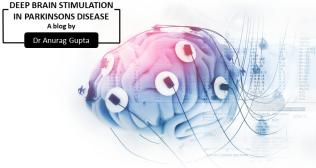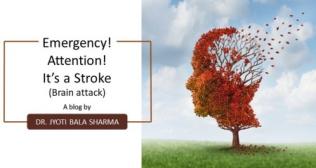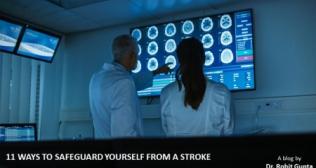
Neurology
Brain Tumours Can Occur At Any Stage
Brain Tumours Can Occur At Any Stage Jun 07, 2014
 No one knows the exact causes of brain tumours, but just the news of having one can be very traumatic. These can occur at any age. Studies have found risk factors for brain tumours to include exposure to radiation in the head and family history. Brain tumours are diagnosed as a result of medical history, physical examination and a variety of specialized tests of the brain and nervous system.
Researchers are studying whether people with certain risk factors are more likely than others to develop a brain tumour. Studies have found that ionizing radiation from high dose radiation therapy from a large machine aimed at the head and other sources can lead to a tumour. Family history can be another risk factor. Researchers are studying whether using cell phones, having had a head injury or having been exposed to certain chemicals at work or to magnetic fields are considered as risk factors, but additional research is needed on the same yet.
SYMPTOMS OF A BRAIN TUMOUR
The most common symptoms of brain tumours are:
? Headaches (usually worse in the morning)
? Nausea and vomiting
? Changes in mood, personality, or ability to concentrate
? Problems with memory
? Changes in speech, vision, or hearing
? Problems balancing or walking
? Muscle twitching/seizures
? Numbness or tingling in the arms or legs
If you have any of these symptoms, you should tell your doctor so that problems can be diagnosed and treated.
DIAGNOSIS
If you have the symptoms suggestive of a brain tumour, your doctor will physically examine and ask about your health history (personal and family). You may need one or more of the following tests:
Neurologic exam: To check your vision, hearing, alertness, muscle strength, coordination, and reflexes. Eye examination to look for swelling caused by a tumour pressing the nerve connecting your eye to the brain.
MRI: A large machine with a strong magnet linked to a computer is used to make detailed pictures of areas inside your head. The pictures can show abnormal areas, such as a tumour.
CT scan: An x-ray machine linked to a computer takes a series of detailed pictures of your head, which makes it easier to view the abnormal areas in the brain.
TREATMENT FOR A BRAIN TUMOUR
Brain tumours have several treatment options, including surgery, radiation therapy, and chemotherapy. Many people receive a combination therapy.
THE CHOICE OF TREATMENT DEPENDS MAINLY ON THE FOLLOWING:
? The type and grade of brain tumour
? Its location in the brain
? Size of the tumour
? Age and general health
SURGERY FOR BRAIN TUMOURS
Surgery is the usual first treatment for most brain tumours. Before surgery, you should discuss the plan for pain relief with your healthcare team. After surgery, your team can adjust the plan if you need more relief. Before surgery begins, you may be given general anaesthesia, and your scalp is shaved. You probably won't need your entire head shaved. If the tumour is in the brain stem or certain other areas, the surgeon may not be able to remove the tumour without harming normal brain tissue; in such a case a surgery may not be possible.
People who can't have surgery may receive radiation therapy or other treatment. You may also feel tired or weak. The time it takes to heal after surgery is different for everyone. You will probably spend a few days in the hospital. You may have a headache or be uncomfortable for the first few days after surgery. However, medicine can usually control pain. Other, less common problems may occur after surgery for a brain tumour. The healthcare team will monitor your signs. You may receive steroids to help relieve swelling. A second surgery may be needed to drain the fluid.
Infection is another problem that may develop after surgery. If this happens, the healthcare team will give you an antibiotic. Brain surgery may harm normal tissue. Brain damage can be a serious problem. It can cause problems with thinking, seeing, or speaking. It can also cause personality changes or seizures.
Most of these problems lessen or disappear with time. But sometimes damage to the brain is permanent. You may need physical therapy, speech therapy, or occupational therapy.
RADIATION THERAPY
Radiation therapy kills brain tumour cells with high-energy xrays, gamma rays, or protons. Radiation therapy usually follows surgery. The radiation kills tumour cells that may remain in the area. Sometimes, people who can't have surgery have radiation therapy instead. Doctors use external and internal types of radiation therapy to treat brain tumours.
External radiation therapy: A large machine is aimed to direct beams of radiation at either the whole brain or at specific portions of the brain. Some people need radiation aimed at the spinal cord also. The treatment schedule depends on your age, the type and size of the tumour.
Internal radiation therapy:
Internal radiation isn't commonly used for treating brain tumours, but is under study. The radiation comes from radioactive material usually contained in very small implants called seeds. The seeds are placed inside the brain and give off radiation for months. They don't need to be removed once the radiation is gone.
CHEMOTHERAPY
Chemotherapy is sometimes used to treat brain tumours. Drugs may be given orally or intravenously or through wafers that are put into the brain. Chemotherapy may be given during and after radiation therapy.
FOLLOW-UP CARE
You'll need regular checkups after treatment for a brain tumour. Checkups help ensure that any changes in your health are noted and treated if needed.
No one knows the exact causes of brain tumours, but just the news of having one can be very traumatic. These can occur at any age. Studies have found risk factors for brain tumours to include exposure to radiation in the head and family history. Brain tumours are diagnosed as a result of medical history, physical examination and a variety of specialized tests of the brain and nervous system.
Researchers are studying whether people with certain risk factors are more likely than others to develop a brain tumour. Studies have found that ionizing radiation from high dose radiation therapy from a large machine aimed at the head and other sources can lead to a tumour. Family history can be another risk factor. Researchers are studying whether using cell phones, having had a head injury or having been exposed to certain chemicals at work or to magnetic fields are considered as risk factors, but additional research is needed on the same yet.
SYMPTOMS OF A BRAIN TUMOUR
The most common symptoms of brain tumours are:
? Headaches (usually worse in the morning)
? Nausea and vomiting
? Changes in mood, personality, or ability to concentrate
? Problems with memory
? Changes in speech, vision, or hearing
? Problems balancing or walking
? Muscle twitching/seizures
? Numbness or tingling in the arms or legs
If you have any of these symptoms, you should tell your doctor so that problems can be diagnosed and treated.
DIAGNOSIS
If you have the symptoms suggestive of a brain tumour, your doctor will physically examine and ask about your health history (personal and family). You may need one or more of the following tests:
Neurologic exam: To check your vision, hearing, alertness, muscle strength, coordination, and reflexes. Eye examination to look for swelling caused by a tumour pressing the nerve connecting your eye to the brain.
MRI: A large machine with a strong magnet linked to a computer is used to make detailed pictures of areas inside your head. The pictures can show abnormal areas, such as a tumour.
CT scan: An x-ray machine linked to a computer takes a series of detailed pictures of your head, which makes it easier to view the abnormal areas in the brain.
TREATMENT FOR A BRAIN TUMOUR
Brain tumours have several treatment options, including surgery, radiation therapy, and chemotherapy. Many people receive a combination therapy.
THE CHOICE OF TREATMENT DEPENDS MAINLY ON THE FOLLOWING:
? The type and grade of brain tumour
? Its location in the brain
? Size of the tumour
? Age and general health
SURGERY FOR BRAIN TUMOURS
Surgery is the usual first treatment for most brain tumours. Before surgery, you should discuss the plan for pain relief with your healthcare team. After surgery, your team can adjust the plan if you need more relief. Before surgery begins, you may be given general anaesthesia, and your scalp is shaved. You probably won't need your entire head shaved. If the tumour is in the brain stem or certain other areas, the surgeon may not be able to remove the tumour without harming normal brain tissue; in such a case a surgery may not be possible.
People who can't have surgery may receive radiation therapy or other treatment. You may also feel tired or weak. The time it takes to heal after surgery is different for everyone. You will probably spend a few days in the hospital. You may have a headache or be uncomfortable for the first few days after surgery. However, medicine can usually control pain. Other, less common problems may occur after surgery for a brain tumour. The healthcare team will monitor your signs. You may receive steroids to help relieve swelling. A second surgery may be needed to drain the fluid.
Infection is another problem that may develop after surgery. If this happens, the healthcare team will give you an antibiotic. Brain surgery may harm normal tissue. Brain damage can be a serious problem. It can cause problems with thinking, seeing, or speaking. It can also cause personality changes or seizures.
Most of these problems lessen or disappear with time. But sometimes damage to the brain is permanent. You may need physical therapy, speech therapy, or occupational therapy.
RADIATION THERAPY
Radiation therapy kills brain tumour cells with high-energy xrays, gamma rays, or protons. Radiation therapy usually follows surgery. The radiation kills tumour cells that may remain in the area. Sometimes, people who can't have surgery have radiation therapy instead. Doctors use external and internal types of radiation therapy to treat brain tumours.
External radiation therapy: A large machine is aimed to direct beams of radiation at either the whole brain or at specific portions of the brain. Some people need radiation aimed at the spinal cord also. The treatment schedule depends on your age, the type and size of the tumour.
Internal radiation therapy:
Internal radiation isn't commonly used for treating brain tumours, but is under study. The radiation comes from radioactive material usually contained in very small implants called seeds. The seeds are placed inside the brain and give off radiation for months. They don't need to be removed once the radiation is gone.
CHEMOTHERAPY
Chemotherapy is sometimes used to treat brain tumours. Drugs may be given orally or intravenously or through wafers that are put into the brain. Chemotherapy may be given during and after radiation therapy.
FOLLOW-UP CARE
You'll need regular checkups after treatment for a brain tumour. Checkups help ensure that any changes in your health are noted and treated if needed. 


















